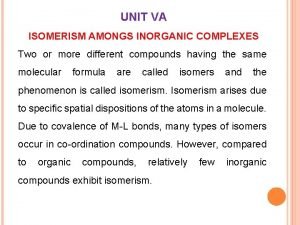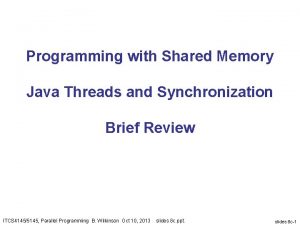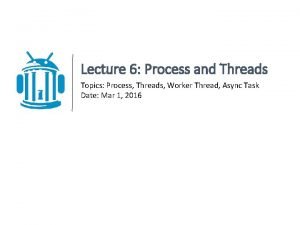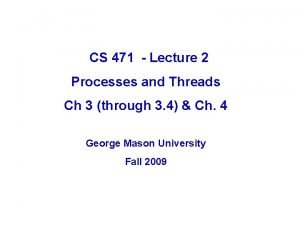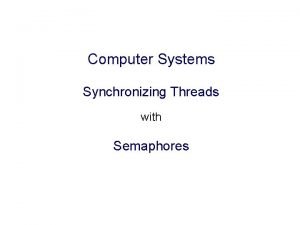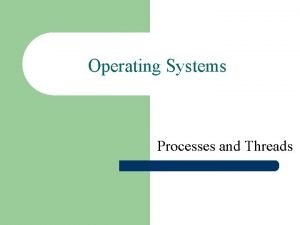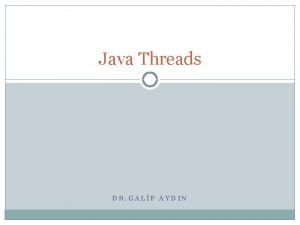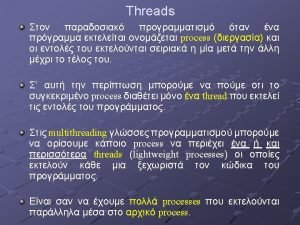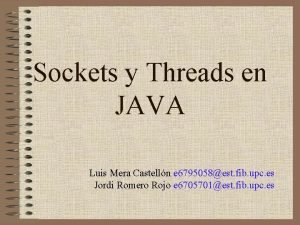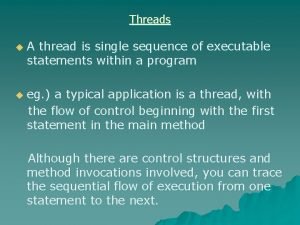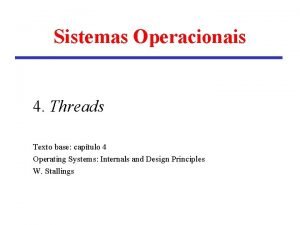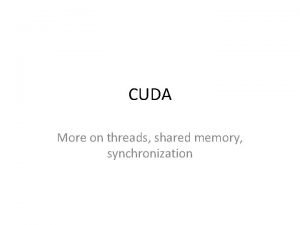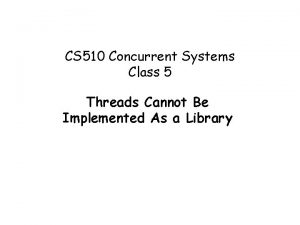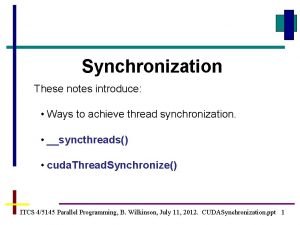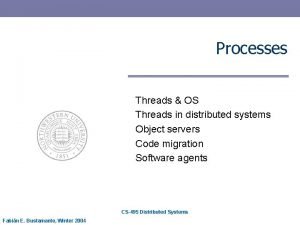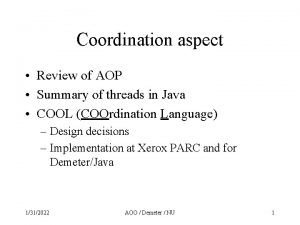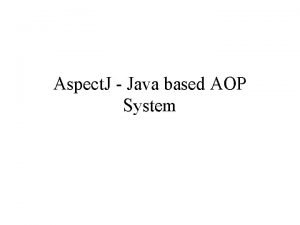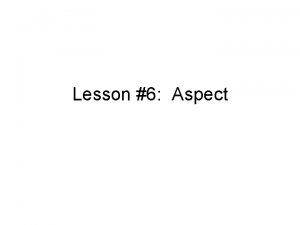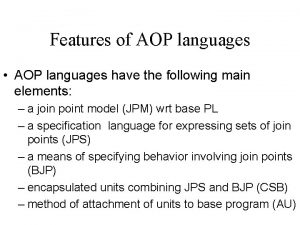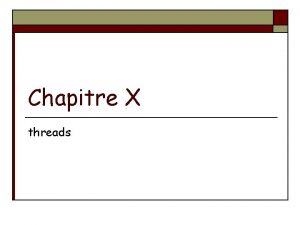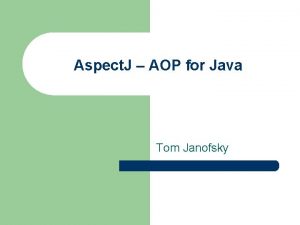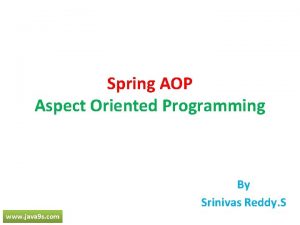Coordination aspect Review of AOP Summary of threads

















![With coordinator: basics Bounded. Buffer { public void put (Object o) (@ array[put. Ptr] With coordinator: basics Bounded. Buffer { public void put (Object o) (@ array[put. Ptr]](https://slidetodoc.com/presentation_image_h2/6bc8fa0832644975712523649b810671/image-18.jpg)













![COOL public class Bounded. Buffer { private Object array[]; private int put. Ptr = COOL public class Bounded. Buffer { private Object array[]; private int put. Ptr =](https://slidetodoc.com/presentation_image_h2/6bc8fa0832644975712523649b810671/image-32.jpg)











- Slides: 43

Coordination aspect • Review of AOP • Summary of threads in Java • COOL (COOrdination Language) – Design decisions – Implementation at Xerox PARC 1/12/2022 Synchronization/AOP 1

the goal is a clear separation of concerns we want: – natural decomposition – concerns to be cleanly localized – handling of them to be explicit – in both design and implementation 1/12/2022 Synchronization/AOP 2

achieving this requires. . . • synergy among – problem structure and – design concepts and – language mechanisms “natural design” “the program looks like the design” 1/12/2022 Synchronization/AOP 3

Cross-cutting of components and aspects better program ordinary program structure-shy functionality structure synchronization 1/12/2022 Synchronization/AOP Components Aspect 1 Aspect 2 4

Aspect-Oriented Programming components and aspect descriptions High-level view, implementation may be different Source Code (tangled code) weaver (compiletime) 1/12/2022 Synchronization/AOP 5

Threads ! Thread 1 1/12/2022 Synchronization/AOP Thread 2 6

Coordination aspect • Put coordination code about thread synchronization in one place. • Threads are synchronized through methods. • Method synchronization – Exclusion sets – Method managers 1/12/2022 Synchronization/AOP 7

Java Threads • Thread class in Standard Java libraries • Thread worker = new Thread(. . . ) • start method spawns a new thread of control based on Thread object. start invokes the threads run method: active thread 1/12/2022 Synchronization/AOP 8

Java Threads • synchronized method: locks object. A thread invoking a synchronized method on the same object must wait until lock released. Mutual exclusion of two threads. class Account { synchronized double get. Balance() { return balance; } synchronized void deposit(double a) { balance += a; } } 1/12/2022 Synchronization/AOP 9

Java Threads • synchronized statements synchronized (expr) statement • lock an object without invoking a synchronized method • expr must produce an object to lock 1/12/2022 Synchronization/AOP 10

Java Threads • communication between threads with wait and notify (defined in class Object). 1/12/2022 Synchronization/AOP 11

Java Threads • notify: after change of data that some other thread is waiting on synchronized void change. Condition(){ // change some value notify. All(); // wakes all waiting threads } 1/12/2022 Synchronization/AOP 12

Problem with synchronization code: it is tangled with component code class Bounded. Buffer { Object[] array; int put. Ptr = 0, take. Ptr = 0; int used. Slots = 0; Bounded. Buffer(int capacity){ array = new Object[capacity]; } 1/12/2022 Synchronization/AOP 13

Tangling synchronized void put(Object o) { while (used. Slots == array. length) { try { wait(); } catch (Interrupted. Exception e) {}; } array[put. Ptr] = o; put. Ptr = (put. Ptr +1 ) % array. length; if (used. Slots==0) notify. All(); used. Slots++; // if (used. Slots++==0) notify. All(); } 1/12/2022 Synchronization/AOP 14

notify. All if (used. Slots==0) notify. All(); used. Slots++; // if (used. Slots++==0) notify. All(); • An extra notify. All never hurts correctness (unless you require hard real-time deadlines), but may reduce efficiency 1/12/2022 Synchronization/AOP 15

notify. All if (used. Slots==0) notify. All(); used. Slots++; // if (used. Slots++==0) notify. All(); • Do we get enough notify? • Need to notify only if buffer was empty and just got a new element 1/12/2022 Synchronization/AOP 16

Solution: tease apart basics and synchronization • write core behavior of buffer • write coordinator which deals with synchronization • use weaver which combines them together • simpler code • replace synchronized, wait, notify and notify. All by coordinators 1/12/2022 Synchronization/AOP 17
![With coordinator basics Bounded Buffer public void put Object o arrayput Ptr With coordinator: basics Bounded. Buffer { public void put (Object o) (@ array[put. Ptr]](https://slidetodoc.com/presentation_image_h2/6bc8fa0832644975712523649b810671/image-18.jpg)
With coordinator: basics Bounded. Buffer { public void put (Object o) (@ array[put. Ptr] = o; put. Ptr = (put. Ptr+1)%array. length; used. Slots++; @) public Object take() (@ Object old = array[take. Ptr]; array[take. Ptr] = null; take. Ptr = (take. Ptr+1)%array. length; used. Slots--; return old; @) 1/12/2022 Synchronization/AOP 18

Coordinator coordinator Bounded. Buffer { selfex put, take; exclusion sets mutex {put, take} condition empty=true, full=false; coordinator variables 1/12/2022 Synchronization/AOP 19

Coordinator method managers with requires clauses and entry/exit clauses put requires (!full) { on exit {empty=false; if (used. Slots==array. length) full=true; }} take requires (!empty) { on exit {full=false; if (used. Slots==0) empty=true; }} } 1/12/2022 Synchronization/AOP 20

exclusion sets • selfex A. f, B. g; – only one thread can call a selfex method – A. f and B. g may run simultaneously. • mutex {g, h, i} mutex {f, k, l} – if a thread calls a method in a mutex set, no other thread may call a method in the same mutex set. 1/12/2022 Synchronization/AOP 21

Multi-class coordination supported coordinator A, B { selfex A. put, B. take; mutex {B. put, A. take} condition empty=true, full=false; . . . 1/12/2022 Synchronization/AOP 22

Design decisions behind COOL • The smallest unit of synchronization is the method. • The provider of a service defines the synchronization (monitor approach). • Coordination is contained within one coordinator. • Association from object to coordinator is static. 1/12/2022 Synchronization/AOP 23

Design decisions behind COOL • Deals with thread synchronization within each execution space. No distributed synchronization. • Coordinators can access the objects’ state, but they can only modify their own state. Synchronization does not “disturb” objects. Currently a design rule not checked by implementation. 1/12/2022 Synchronization/AOP 24

COOL • Provides means for dealing with mutual exclusion of threads, synchronization state, guarded suspension and notification ! Thread 1 Thread 2 coordinator 1/12/2022 Synchronization/AOP 25

COOL • Identifies “good” abstractions for coordinating the execution of OO programs – coordination, not modification of the objects – mutual exclusion: sets of methods – preconditions on methods 1/12/2022 Synchronization/AOP 26

plain Java public class Shape { protected double x_ = 0. 0; y_ = 0. 0; width_ = 0. 0; height_ = 0. 0; double x() { return x_(); } double y() { return y_(); } double width(){ return width_(); } double height(){ return height_(); } COOL Shape coordinator Shape { selfex {adjust. Location, adjust. Dimensions} mutex {adjust. Location, x} mutex {adjust. Location, y} mutex {adjust. Dimensions, width} mutex {adjust. Dimensions, height} } void adjust. Location() { x_ = long. Calculation 1(); y_ = long. Calculation 2(); } void adjust. Dimensions() { width_ = long. Calculation 3(); height_ = long. Calculation 4(); } } 1/12/2022 Synchronization/AOP 27

Extreme cases • All methods synchronized: monitor. A lot of parallelism is excluded. Conservative. • No method synchronized: A lot of parallelism. Very dangerous. Bad things can happen. Don’t do it. • Exclusion sets: are in between. 1/12/2022 Synchronization/AOP 28

Programming with COOL Protocol object/coordinator: coordinator 3 7 2 4 6 8 1 5 m() {…} object 1/12/2022 1: method invocation 2: request presented to the coordinator 3: coordinator checks synchronization state, eventually suspending thread; when thread can proceed, coordinator performs “on_entry” actions 4: request proceeds to the object 5: method execution 6: return is presented to coordinator 7: coordinator performs “on_exit” actions Synchronization/AOP 29 8: method returns

COOL View of Classes • Stronger visibility: – coordinator can access: • all methods and variables of its classes, independent of access control • all non-private methods and variables of their superclasses • Limited actions: – only read variables, not modify them – only coordinate methods, not invoke them 1/12/2022 Synchronization/AOP 30

Xerox PARC Implemention Implementing COOL Programming with COOL coordinator object coordinator 3 1 33 7 2 4 6 8 5 m() {…} 1 object Implementation Semantics 1/12/2022 7 Synchronization/AOP 31
![COOL public class Bounded Buffer private Object array private int put Ptr COOL public class Bounded. Buffer { private Object array[]; private int put. Ptr =](https://slidetodoc.com/presentation_image_h2/6bc8fa0832644975712523649b810671/image-32.jpg)
COOL public class Bounded. Buffer { private Object array[]; private int put. Ptr = 0, take. Ptr = 0; private int used. Slots = 0; public Bounded. Buffer(int capcty){ array = new Object[capcty]; } public void put(Object o) { array[put. Ptr] = o; put. Ptr = (put. Ptr+1)%array. length; used. Slots++; } public Object take() { Object old = array[take. Ptr]; array[take. Ptr] = null; take. Ptr = (take. Ptr+1)%array. length; used. Slots--; return old; } } 1/12/2022 coordinator Bounded. Buffer { selfex {put, take} mutex {put, take}; boolean full=(@ false @), empty=(@ true @); put requires (@ !full @) { on exit (@ empty = false; if (used. Slots==array. length) full = true; @) } take requires (!empty){ on exit (@ full = false; if (used. Slots == 0) empty = true; @) } } Synchronization/AOP 32

Implementing COOL Bounded. Buffer. Coord _dcoord // rest of the variables protected void _d_put(Object o){ //implementation code 2 } 5 public void put(Object o) { _dcoord. enter_put(this); try { _d_put(o); } 6 1 finally { _dcoord. exit_put(this); } } protected Object _d_take() { //implementation code } public Object take() { //similar to put } 1/12/2022 4 8 // variable next page synchronized void enter_put(Bounded. Buffer o){ //. . . 3 } synchronized void exit_put(Bounded. Buffer o) { //. . . 7 } synchronized void enter_take(Bounded. Buffer o){ //. . . } synchronized void exit_take(Bounded. Buffer o) { //. . . } Synchronization/AOP 33

Implementing COOL class Bounded. Buffer. Coord { Meth. State put = new Meth. State(); Meth. State take = new Meth. State(); boolean empty = true, full = false; public synchronized void enter_put(Bounded. Buffer o) { while (put. is. Busy. By. Other. Thread() || take. is. Busy. By. Other. Thread() || full) { try { wait(); } catch (Interrupted. Exception e) {} } put. in(); } public synchronized void exit_put(Bounded. Buffer o) { put. out(); empty = false; if (o. _dget_usedlots()==o. _dget_size()) full=true; notify. All(); }. . . 1/12/2022 Synchronization/AOP 34

Implementing COOL class Bounded. Buffer. Coord { Meth. State put = new Meth. State(); Meth. State take = new Meth. State(); boolean empty = true, full = false; to keep track of method execution state public synchronized void enter_put(Bounded. Buffer o) { while (put. is. Busy. By. Other. Thread() || take. is. Busy. By. Other. Thread() || full) { try { wait(); } catch (Interrupted. Exception e) {} } put. in(); } public synchronized void exit_put(Bounded. Buffer o) { put. out(); empty = false; if (o. _dget_usedlots() == o. _dget_size()) full = true; notify. All(); } 1/12/2022 Synchronization/AOP 35. . .

One class to support COOL class Method. State { int depth = 0; Vector t 1 = new Vector(); final public boolean is. Busy. By. Other() { if (depth > 0 && !t 1. contains(Thread. current. Thread())) return true; else return false; } final public void in() { depth++; t 1. add. Element(Thread. current. Thread()); } final public void out() { depth--; …} 1/12/2022 Synchronization/AOP 36

Implementing COOL class Bounded. Buffer. Coord { Meth. State put = new Meth. State(); Meth. State take = new Meth. State(); boolean empty = true, full = false; coordination vars public synchronized void enter_put(Bounded. Buffer o) { while (put. is. Busy. By. Other. Thread() || take. is. Busy. By. Other. Thread() || full) { try { wait(); } catch (Interrupted. Exception e) {} } put. in(); } public synchronized void exit_put(Bounded. Buffer o) { put. out(); empty = false; if (o. _dget_usedlots()==o. _dget_size()) full=true; notify. All(); }. . . 1/12/2022 Synchronization/AOP 37

class Bounded. Buffer. Coord { Meth. State put = new Meth. State(); Meth. State take = new Meth. State(); boolean empty = true, full = false; Implementing COOL public synchronized void enter_put(Bounded. Buffer o) { while (put. is. Busy. By. Other. Thread() || take. is. Busy. By. Other. Thread() || full) { try { wait(); } catch (Interrupted. Exception e) {} conditions for waiting } put. in(); } public synchronized void exit_put(Bounded. Buffer o) { put. out(); empty = false; if (o. _dget_usedlots() == o. _dget_size()) full = true; notify. All(); }. . . 1/12/2022 Synchronization/AOP 38

Implementing COOL class Bounded. Buffer. Coord { Meth. State put = new Meth. State(); Meth. State take = new Meth. State(); boolean empty = true, full = false; public synchronized void enter_put(Bounded. Buffer o) { while (put. is. Busy. By. Other. Thread() || take. is. Busy. By. Other. Thread() || full) { try { wait(); } catch (Interrupted. Exception e) {} } put. in(); update method state } public synchronized void exit_put(Bounded. Buffer o) { put. out(); empty = false; if (o. _dget_usedlots() == o. _dget_size()) full = true; notify. All(); }. . . 1/12/2022 Synchronization/AOP 39

Implementing COOL class Bounded. Buffer. Coord { Meth. State put = new Meth. State(); Meth. State take = new Meth. State(); boolean empty = true, full = false; public synchronized void enter_put(Bounded. Buffer o) { while (put. is. Busy. By. Other. Thread() || take. is. Busy. By. Other. Thread() || full) { try { wait(); } catch (Interrupted. Exception e) {} } put. in(); } public synchronized void exit_put(Bounded. Buffer o) { put. out(); empty = false; update method state if (o. _dget_usedlots() == o. _dget_size()) full = true; notify. All(); }. . . 1/12/2022 Synchronization/AOP 40

Implementing COOL class Bounded. Buffer. Coord { Meth. State put = new Meth. State(); Meth. State take = new Meth. State(); boolean empty = true, full = false; public synchronized void enter_put(Bounded. Buffer o) { while (put. is. Busy. By. Other. Thread() || take. is. Busy. By. Other. Thread() || full) { try { wait(); } catch (Interrupted. Exception e) {} } put. in(); } public synchronized void exit_put(Bounded. Buffer o) { put. out(); on_exit statements empty = false; if (o. _dget_usedlots()==o. _dget_size()) full=true; notify. All(); } 1/12/2022 Synchronization/AOP 41. . .

class Bounded. Buffer. Coord { Meth. State put = new Meth. State(); Meth. State take = new Meth. State(); boolean empty = true, full = false; Implementing COOL public synchronized void enter_put(Bounded. Buffer o) { while (put. is. Busy. By. Other. Thread() || take. is. Busy. By. Other. Thread() || full) { try { wait(); } catch (Interrupted. Exception e) {} } put. in(); } public synchronized void exit_put(Bounded. Buffer o) { put. out(); empty = false; if (o. _dget_usedlots()==o. _dget_size()) full=true; notify. All(); notify state change }. . . 1/12/2022 Synchronization/AOP 42

Acknowledgments • Many of the viewgraphs prepared by Crista Lopes for her Ph. D. work supported by Xerox PARC. • Implementation of COOL for Demeter/Java by Josh Marshall. Integration into Demeter/Java with Doug Orleans. • ECOOP ‘ 94 paper on synchronization patterns by Lopes/Lieberherr. 1/12/2022 Synchronization/AOP 43
 Structure d'un texte
Structure d'un texte Octahedral optical isomers
Octahedral optical isomers Aop network
Aop network Jboss aop
Jboss aop Filter interceptor aop
Filter interceptor aop Amplificateur
Amplificateur Spring boot aspect example
Spring boot aspect example Determine_locale
Determine_locale What is aop
What is aop Aop
Aop 1 11 12 1121 122111
1 11 12 1121 122111 C11 thread
C11 thread Shared memory java
Shared memory java Conventional representation of external screw thread
Conventional representation of external screw thread Process and threads
Process and threads A flexible flat material made by interlacing threads/fibers
A flexible flat material made by interlacing threads/fibers Escalonamento de threads
Escalonamento de threads Process and threads
Process and threads Os threads
Os threads The vinaya pitaka is a sacred text of………….
The vinaya pitaka is a sacred text of…………. Needle like threads of spongy bone
Needle like threads of spongy bone Waxy coated paper which transfers pattern markings
Waxy coated paper which transfers pattern markings Threads performance management
Threads performance management Pintos project 1 alarm clock
Pintos project 1 alarm clock What is thread in operating system
What is thread in operating system Posix threads in os
Posix threads in os Threads java
Threads java Alternanthera red threads
Alternanthera red threads Forum.unity.com/threads/game-over.54735
Forum.unity.com/threads/game-over.54735 /threads/ fiji
/threads/ fiji Threads consume cpu in best possible manner
Threads consume cpu in best possible manner Sockets and threads
Sockets and threads Posix threads
Posix threads Forum.unity.com/threads/game-over.54735
Forum.unity.com/threads/game-over.54735 Heavyweight processes
Heavyweight processes Sequence diagram threads
Sequence diagram threads Threads cannot be implemented as a library
Threads cannot be implemented as a library Threads.h
Threads.h The material used for drill can be mcq
The material used for drill can be mcq Cuprintf
Cuprintf Threads cannot be implemented as a library
Threads cannot be implemented as a library The kernel is unaware of user threads
The kernel is unaware of user threads Cuda synchronize threads
Cuda synchronize threads Threads in distributed systems
Threads in distributed systems

